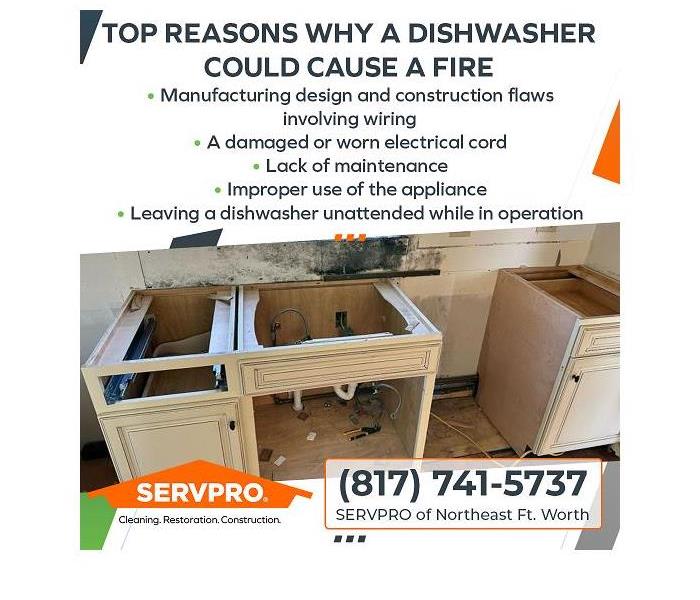Five Factors That Contribute to Fire Damage and Water Damage Caused by a Dishwasher
2/14/2023 (Permalink)
Blog Summary: SERVPRO of Northeast Fort Worth provides homeowners with the fire and water damage restoration services they need when the dishwasher causes a fire.
Locally owned and operated, SERVPRO of Northeast Fort Worth provides fire damage and water damage restoration services for Saginaw, TX, homes hit by a property damage disaster caused by fire or water damage from a dishwasher.
The dishwasher is one of the most appreciated home appliances of all time. No more sweating over a steamy sink of hot water scrubbing a mountain of dirty dishes, pots, and pans. Recent innovations in dishwasher technology have made the appliance more energy efficient, remarkably quiet, and less wasteful of water. In fact, the dishwasher uses much less water than manual dishwashing and rinsing in the sink. Standard-sized Energy Star dishwashers manufactured since 1994 use about four gallons of water per load, while sink washing uses about four gallons of water every two minutes.
However, the dishwasher is a non-cooking appliance that poses a serious fire hazard for the home. The dishwasher can cause a fire when improperly used or when the unit malfunctions. Much like ovens, dishwashers are manufactured with electrical wiring, electronic boards, and a heating coil, and the combination of water and electricity helps to explain the risk factors arising from the operation of a dishwasher in the home. Below are some top reasons why a dishwasher could cause a fire.
1. Manufacturing design and construction flaws involving wiring
Many fire incidents involving dishwashers happen due to design or manufacturing errors. The dishwasher operates in a water-intensive environment. A leak at a gasket or a crack in the bottom of the unit can short-circuit the electrical connections, resulting in a fire. Leaks in this area of the device factor prominently among the main causes of a dishwasher-related fire. A major manufacturer of dishwashers in the US recalled 2.5 million units for faulty wiring in 2007. Another issue arose when tens of thousands of units failed to shut down the heating coil, resulting in many fires.
2. A damaged or worn electrical cord
Most residential dishwashers operate on 240 volts, much the same as the stove. That amount of electricity near that much water can potentially be extremely dangerous. Over time, the electrical cord can become worn, cracked, or frayed. Also, rats and mice could chew the plastic insulation on the exterior of the cord. Once the waterproof binding is compromised, the risk of fire greatly increases. The condition of the cord can lead to electrocution. If the frayed cord generates sparks, flammable materials in the area can easily ignite.
The frayed or damaged cord requires immediate attention from a licensed electrician. Working with high voltage is not safe for the DIY novice and should be left to the professionals.
3. Lack of maintenance
Regularly scheduled maintenance is the key to safety, peak performance, and the appliance's longevity.
- Clean the filter monthly with baking soda and vinegar or a commercial cleaner to remove grease and bits of food from inside the filter. The grease and food particles can ignite during the drying cycle.
- Keep a vigilant eye out for leaks. Have all leaks inspected and repaired as quickly as possible. Avoid using the appliance until repairs have been completed. When water and “hot” wiring combine, the result can be an electrical fire.
- A thorough inspection every year ensures the appliance is working safely and efficiently.
4. Improper use of the appliance
A dishwasher is a sturdy appliance that can last many years if well-maintained and properly operated. One of the chief ways a dishwasher is improperly used is by overloading the unit. An overloaded dishwasher will not adequately clean the load. The temptation is to immediately run another cycle. Back-to-back runs can damage the heating element, which needs time between cycles to rest and cool. If the element cannot be replaced, the appliance must be replaced.
Do not run the electrical cord under the carpeting. The foot traffic can damage the cord over time, exposing wiring which can arc and ignite a fire in the carpeting or rug. An extension cord should not be used except when necessary. Remember, the dishwasher runs on 240 volts, so the cord coming from the dishwasher should match the electrical load of the dishwasher.
5. Leaving a dishwasher unattended while in operation
An unattended operational dishwasher is a fire damage or water damage disaster waiting to happen. Avoid going to sleep or leaving home while the appliance is in action. If the unit springs a leak, water sensors may not be activated to shut off the flow of water. Seven or more gallons of water a minute can flow out of a burst supply line or a leaking dishwasher. Baseboards can swell beyond recognition and need replacing. Large portions of flooring substrate may warp, buckle, and collapse. The finished room in the basement under the kitchen could suffer extensive water damage, including collapsed ceiling tiles, damaged electrical devices, ruined carpeting, and a terrible mold infestation.
Keep small children away from the dishwasher. The temptation is too great to explore, research, and experiment, but an experiment with the dishwasher could burn the home to the ground.
When faced with fire damage, smoke damage, or water damage disaster, turn to the professionals at SERVPRO of Northeast Fort Worth for cleanup and restoration services. Available 24/7, 365 days a year, including holidays, the crew provides a rapid response in about an hour and a quick cleanup and restoration process to get life back to normal as soon as possible.
To learn more about Fort Worth, TX, water damage restoration, email SERVPRO of Northeast Fort Worth at office@SERVPROnortheastftworth.com or call (817) 741-5737.





 24/7 Emergency Service
24/7 Emergency Service
